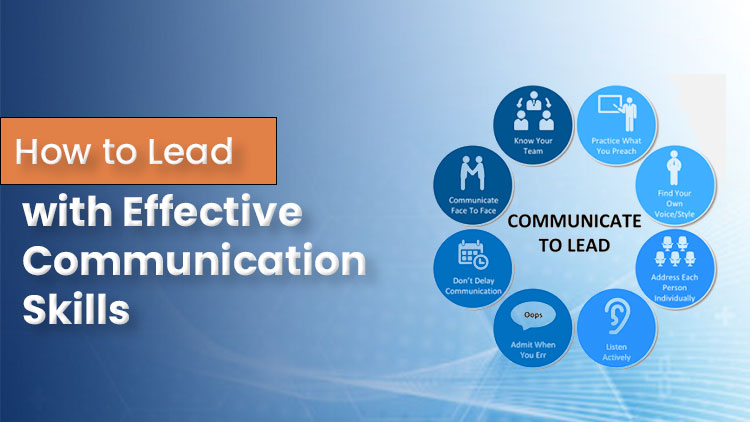
How to Lead with Effective Communication Skills


When you step into the realm of impactful leadership, you’ll come across personalities like Martin Luther King Jr., Ronald Reagan, or Barack Obama—remarkable figures admired not just for their positions but for their remarkable prowess in communication.
Think of Dr. King’s stirring “I Have a Dream” speech; it’s a beacon of effective communication. Leaders of this caliber possess a unique knack for translating their visions into motivational fuel, igniting inspiration and empowerment in their spheres—be it in political realms, personal bonds, or professional landscapes. The art of communication isn’t merely a leadership trait; it’s the very heartbeat that forges connections, fosters trust, and fuels collective action toward a shared goal.
Have you often found yourself thinking, “How do I improve my communication skills and become a better leader?” Well then, keep reading to find your answer!
What Is Effective Communication?
Effective communication involves the exchange of ideas, thoughts, knowledge, and data to ensure a message is not just conveyed but also comprehended with precision and intent. A successful communication leaves both the sender and receiver content.
Communication spans diverse forms—verbal, non-verbal, written, visual, and auditory. It transcends physical boundaries, occurring in person, online (across forums, social platforms, websites), via phone (apps, calls, video), or through traditional mail.
So, what makes a good communication? For communication to be impactful, it should be clear, complete, correct, concise, and compassionate—termed as the 5 C’s, though interpretations may vary.
Though challenging to quantify, the influence of effective communication is indisputable. Studies reveal that large corporations in the US and UK lose approximately $62.4 million annually due to communication shortcomings. Conversely, businesses guided by adept communicators witnessed nearly a 50% surge in total shareholder returns compared to those led by less effective communicators.
What is the Relationship between Effective Communication and Effective Leadership?

Imagine effective communication as the superhero cape that turns good leaders into great ones! It’s the secret sauce that powers leadership to new heights. Picture this: leaders who can clearly express their vision, motivate their teams, and create a harmonious workplace – that’s the magic of effective communication in action.
It’s like the language of success in leadership. When leaders communicate effectively, they don’t just talk; they inspire, influence, and empower. Think about it as a dynamic force that builds trust, opens up dialogue, and fuels collaboration among team members.
But it’s not just about delivering speeches or emails. Effective communication allows leaders to create a space where everyone feels valued, heard, and included. It’s the ultimate tool that helps leaders steer through storms, resolve conflicts, and unite their team toward a common goal.
In short, effective communication isn’t just a skill; it’s the superhero power that transforms leaders into inspirational guides, navigators, and champions for success!
Why Leadership Communication Skills Are Important
The power of leadership communication lies in its ability to foster strong connections and build a cohesive team environment. Effective communication, be it facilitating day-to-day interactions or keeping executives informed, is an essential skill for leaders, enabling them to engage effectively with diverse individuals in various settings.
Leadership communication skills are important because they:
- Promote collaboration among team members and across different departments.
- Maintain open and transparent communication channels between team members and managers.
- Ensure a clear understanding of team members’ roles and responsibilities.
- Enhance team productivity.
- Align employee focus on goals and desired outcomes.
Types of Leadership Communication Skills

Here are several key elements of successful leadership communication that, when honed in the workplace, can elevate your effectiveness as a leader:
- Active Listening: It’s the capacity to fully concentrate on the person speaking, ensuring comprehension and providing meaningful responses that convey understanding and value to team members.
- Narrative Ability: Storytelling stands as a powerful tool for fostering trust, building connections, and inspiring action. Whether presenting value propositions or articulating a mission, adept storytelling resonates and empowers others.
- Flexibility: Not all team members communicate alike, prompting effective leaders to adapt their communication styles to suit varied preferences within the workplace.
- Motivation: Skilled leaders leverage communication to inspire and encourage their teams. Understanding individual motivators helps tailor communication that resonates with team members.
- Open-Mindedness: This skill involves understanding others’ perspectives without imposing changes on their beliefs. It aids in grasping the depth of their communication, fostering informed decision-making.
- Empathy: Cultivating empathy enhances receptivity to your message, enabling a deeper understanding of employees’ emotions and needs.
- Delegation: Clearly articulating the reasoning behind task assignments and expectations motivates team members to strive for productivity and excellence.
- Positive Communication: Infusing positivity into communication significantly influences team morale and reception of your messages, setting a tone that inspires a positive workplace culture.
- Situational Awareness: Leaders adept in recognizing nonverbal cues and body language within their teams can interpret responses more effectively, tailoring their communication accordingly.
- Nonverbal Communication: Effective leaders understand and utilize appropriate nonverbal cues—facial expressions, gestures, nods—as complements to their verbal communication, ensuring consistency between verbal and nonverbal messages.
How Leaders Can Develop Their Communication Skills

So, how do you communicate effectively with others? Often, the most impactful messages are those kept simple.
Any form of communication loses its value if it lacks clarity, be it written, spoken, formal, or casual. Leading with effective communication strategies— while ensuring engagement and covering all essential information required by your team— is a high-level communication skill. Let’s have a look at some ways you can communicate better as a leader.
Training and Education for Leadership Development
Leaders have the opportunity to engage in courses or workshops focused on honing effective communication and leadership abilities. Such endeavors equip them with the essential knowledge and skills imperative for effective communication.
Example: A CEO enrolls in an executive leadership course focusing on effective communication, engaging in workshops that teach strategies for impactful communication within their organization.
Practical Application and Receiving Input
Leaders can put their communication skills to the test in real-world scenarios, actively seeking feedback from peers and colleagues. This process aids in pinpointing areas that require improvement and adapting their communication style accordingly.
Example: A team leader regularly conducts meetings and actively seeks feedback from team members on their presentation styles, adapting based on suggestions to enhance clarity and engagement.
Self-Reflection
Effective leaders take moments for self-reflection to assess their communication approaches and identify potential areas for enhancement. Additionally, they observe diverse communication styles, learning from both preferences and dissatisfactions in others’ techniques.
Example: A department head takes time to reflect on their recent presentations, recognizing instances where they could have conveyed messages more succinctly or employed better engagement techniques.
Guidance through Coaching and Mentorship
Have you wondered how leaders excel in communication roles? Collaborating with a coach or mentor offers leaders invaluable guidance and support while they refine their communication proficiencies.
Example: A manager engages a seasoned executive coach to assist in refining their communication skills, receiving guidance on how to navigate challenging discussions and inspire team members effectively.
Studying and Researching
Leaders dedicate time to exploring books, articles, and research material on effective communication and leadership, deepening their comprehension of these topics.
Example: An emerging leader avidly reads books and articles on influential communication styles, leveraging insights to structure their speeches and presentations more persuasively.
Observation and Emulation
Leaders actively observe the communication practices of their counterparts, learning from their methodologies. Seeking out role models allows them to glean insights and adopt elements of effective communication styles.
Example: An aspiring leader attends conferences to observe keynote speakers, noting their body language and delivery to refine their own communication style.
Embracing Feedback
Leaders maintain an openness to feedback from teams and peers, acknowledging its significance in understanding the perception and reception of their communication approaches. This openness allows them to adapt and refine their communication styles based on valuable insights.
Example: An executive actively seeks input from the team after a company-wide address, making adjustments based on received feedback to improve future presentations and town hall meetings.
Be Transparent
In meetings, leaders should keep their team informed about the actions taken by the company’s management. Sharing insights into the organization’s objectives, prospects, and obstacles significantly impacts the company’s culture. Transparently communicating the fundamental factors that influence decision-making will ensure alignment across the team.
Example: During a team briefing, a manager shares the company’s goals and challenges. By understanding the rationale behind decision-making, the team feels more connected and aligned with the organization’s direction.
Enhancing Your Leadership Communication Skills
At the heart of effective leadership lies communication. To inspire and influence your team, embrace empathy and transparency while being aware of how others perceive your verbal and non-verbal cues.
Start improving your communication skills by evaluating your impact and pinpointing areas for growth. Set clear goals and establish simple strategies for effective leadership communication. Monitor your approaches and celebrate small successes.
Ready to enhance your communication prowess as a leader? Dive into Elevate Your Leadership: 8 Effective Communication Skills, now available as an audiobook on Amazon Audible!. This resource equips leaders with essential tools to enhance their communication skills, fostering stronger connections, clearer directives, and cohesive team dynamics. With the convenience of an audiobook, you can absorb these vital lessons anytime, anywhere.
- Published Date:



